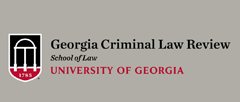Georgia Criminal Law Review
Document Type
Article
Abstract
In the past decade, and in response to criticism surrounding Article 213 Sexual Assault and Related Offenses of the 1962 Model Penal Code (MPC), the American Law Institute (ALI) sought to re-examine these specific provisions. In doing so, the ALI attempted to incorporate a more modern standard of sexual behavior and consent, without making the model code too punitive. Recently in 2022, the ALI approved revisions to Article 213 MPC, referred to in this Article as the “Revised Code,” including the rejection of an affirmative consent definition. This Article argues that despite the noble intentions of revising an outdated code, these new revisions—that dive into the heart of the debate surrounding consent and sexual offenses—ultimately are a backward step that will add to the burdens imposed on sexual assault and rape victims. By scrutinizing each step in the reexamining of Article 213, specifically Section 213.0, the currently approved definition of consent, this Article shows how the Revised Code could negatively impact states’ affirmative consent definition statutes as well as the nation as a whole. This Article concludes by recommending that both the 1962 Article 213 and the current 2022 Revised Code by disregarded. Instead, a new project to reexamine the 1962 Article 213, specifically 213.0, should be undertaken, one that specifically includes an affirmative consent definition.
Recommended Citation
Newman, Samantha
(2023)
"Reexamining the Consent Definition Under Article 213: Sexual Assault and Related Offenses of the Model Penal Code and Its Troubling Influence on Affirmative Consent Definition States,"
Georgia Criminal Law Review: Vol. 1:
No.
2, Article 5.
Available at:
https://digitalcommons.law.uga.edu/gclr/vol1/iss2/5

